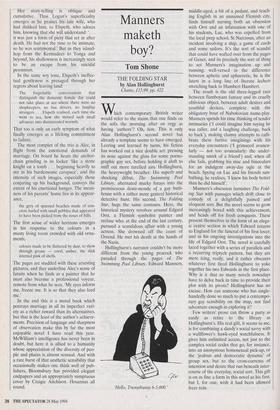Leaving the sure behind
Andro Linklater
DEBATABLE LAND by Candia McWilliam
Bloomsbury, £14.99, pp. 216
Itravel for travel's sake', R. L. Steven- son wrote early in his career. 'The great affair is to move.' At the time he was mere- ly walking through the Cevennes accompa- nied by a donkey, but eventually he achieved what seems to me the ideal motion, that of sailing across the long blue rollers of the South Pacific from coral island to coral island.
Although other refugees from stability have followed him there, what continues to give his journeys in the South Seas their particular appeal is the symmetry they dis- play between the restlessness of a northern imagination and the restfulness of southern movement. It is this counterpoise that pro- vides the template for Candia McWilliam's third novel, Debatable Land. Ostensibly it is concerned with the voyage of the yacht Ardent Spirit, from Tahiti to New Zealand, but at its back is the particular imprint that Scotland has left upon the three of its six crew who grew up there.
The debt to Stevenson the traveller is acknowledged in a fragment from his Songs of Travel printed on the opening page, but much also is owed to Stevenson the hus- band, who observed that
to marry is to domesticate the Recording Angel. Once you are married there is nothing left for you, not even suicide, but to be good.
What the voyage gradually reveals is that in the secrecy of their moralising con- sciences, each of the Scots on board Logan Urquhart, the wealthy owner of the boat, Elspeth, his passively deceived wife, and Alec Dundas, a painter running away to sea — would rather seek goodness in suicide or divorce or adultery than in the constraints of marriage.
McWilliam's two earlier books, A Case of Knives and A Little Stranger, won high praise for their cerebral brilliance, though I must admit to finding them claustrophobic and a little heartless. Here, however, she adopts an old-fashioned tone of authorial omnipotence, ranging confidently through time, space and psychic blocks, and weav- ing together Scottish past and Pacific pre- sent with a sureness of touch that almost obscures the loose structure. Her story-telling is oblique and cumulative. Thus Logan's superficiality emerges as he praises his late wife, who had disliked him, to Elspeth, who adores him, knowing that she will understand: `... it was just a form of piety that set in after death. He had not the time to be intimate, so he was sentimental.' But as they island- hop from the Kermadecs to Tonga and beyond, his shallowness is increasingly seen to be an escape from his suicidal pessimism.
In the same wry tone, Elspeth's ineffec- tual gentleness is presaged through her regrets about leaving land:
The forgettable conversations that distinguish the domestic female day could not take place at sea where there were no shopkeepers, no bus drivers, no familiar strangers . . . Elspeth realised, each time she went to sea, how she missed such small advances into disinterested warmth.
That too is only an early symptom of what finally emerges as a lifelong commitment to failure.
The most complex of the trio is Alec, in flight from the emotional demands of marriage. On board he hears the anchor- chain grinding in its locker 'like a stone knight on a tomb . . . beginning heavily to stir in his burdensome carapace', and the intensity of such images, especially those conjuring up his background, conveys the extent of his emotional hunger. The mean- ness of his parents' home lies in its appear- ance,
the grey of spurned beaches made of con- crete harled with small pebbles that appeared to have been picked from the noses of hills.
The first sense of wider horizons emerges in his response to the colours in a musty living room crowded with old orna- ments,
colours made to be flattered by dust, to show through grease — coral, amber, the slick internal pink of shells.
The pages are studded with these arresting pictures, and they underline Alec's sense of fatuity when he finds as a painter that he must also become a professional voyeur, remote from what he sees. 'My eyes inform me, freeze me. It is so that they also feed me.'
In the end this is a moral book which portrays marriage in all its imperfect vari- ety as a richer reward than its alternatives, but that is the least of the author's achieve- ments. Precision of language and sharpness of observation make this by far the most enjoyable novel I have read this year. McWilliam's intelligence has never been in doubt, but here it is allied to a humanity whose appreciation of the diversity of peo- ple and places is almost sensual. And with a rare burst of that aesthetic sensibility that occasionally makes one think well of pub- lishers, Bloomsbury has provided elegant endpapers and an appropriately sumptuous cover by Craigie Aitchison. Hosannas all round.



























































 Previous page
Previous page